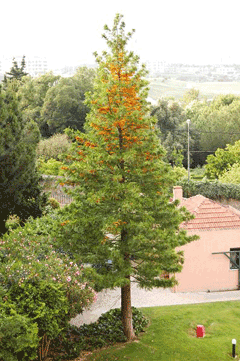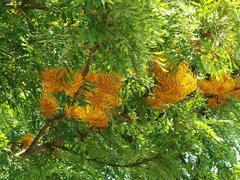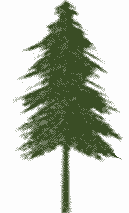 |
|
http://commons.wikimedia.org/wiki/User:MarioM |
 |
| http://commons.wikimedia.org/wiki/User:Alvesgaspar |
Translate this page:
Summary
Bloom Color: Orange, Yellow. Main Bloom Time: Early spring, Late spring, Mid spring. Form: Oval, Pyramidal.
Physical Characteristics

 grevillea robusta is an evergreen Tree growing to 30 m (98ft) by 15 m (49ft) at a fast rate.
grevillea robusta is an evergreen Tree growing to 30 m (98ft) by 15 m (49ft) at a fast rate.
See above for USDA hardiness. It is hardy to UK zone 9. It is in leaf all year, in flower from April to May. The species is hermaphrodite (has both male and female organs) and is pollinated by Bees.
Suitable for: light (sandy), medium (loamy) and heavy (clay) soils and prefers well-drained soil. Suitable pH: mildly acid and neutral soils. It can grow in semi-shade (light woodland) or no shade. It prefers dry or moist soil and can tolerate drought.
UK Hardiness Map
US Hardiness Map
Synonyms
Plant Habitats
Woodland Garden Secondary; Sunny Edge; Dappled Shade;
Edible Uses
Edible Parts: Nectar
Edible Uses: Gum
The flowers are one of the richest sources of nectar[183]. This can be sucked directly from the flowers, shaken into a bowl or washed out in a small quantity of water[183]. The nectar falls in showers when the flowers are shaken[144].
References More on Edible Uses
Medicinal Uses
Plants For A Future can not take any responsibility for any adverse effects from the use of plants. Always seek advice from a professional before using a plant medicinally.
None known
References More on Medicinal Uses
The Bookshop: Edible Plant Books
Our Latest books on Perennial Plants For Food Forests and Permaculture Gardens in paperback or digital formats.

Edible Tropical Plants
Food Forest Plants for Hotter Conditions: 250+ Plants For Tropical Food Forests & Permaculture Gardens.
More

Edible Temperate Plants
Plants for Your Food Forest: 500 Plants for Temperate Food Forests & Permaculture Gardens.
More

More Books
PFAF have eight books available in paperback and digital formats. Browse the shop for more information.
Shop Now
Other Uses
Dye Gum Rootstock Wood
The plant yields small quantities of a gum resin[154]. The leaves contain rutin, though quantities are not specified[240]. Intense yellow and green dyes are obtained from the leaves[168]. This tree is one of the most important reafforestation trees in Nepal[272]. This species is more resistant than other members of the genus to root-rotting fungus, it is sometimes used as a rootstock for the more susceptible species[200]. Wood - strong, silky textured, light, easily split, durable but porous. Used for panelling, joinery, cabinet making etc[154, 156, 167]. A good fuel[272].
Special Uses
References More on Other Uses
Cultivation details
Landscape Uses:Container, Pest tolerant, Aggressive surface roots possible. An easy and fast-growing tree requiring a well-drained slightly acid soil and a sunny position[260]. It prefers a rich moist soil[167], but it also succeeds in dry soils. Dislikes limey soils[1, 157]. Established plants are drought resistant[154]. This species is not very hardy when grown outdoors in Britain. In its native range it does experience frosts, though these are normally light and short-lived[167]. Plants tolerate temperatures down to -7°c in Australian gardens[157] though this cannot be translated directly to British gardens because of our cooler summers and longer, colder and wetter winters. It is usually grown as a pot plant in Britain, though it rarely flowers here[1]. A very ornamental plant[1], it is often grown as a street tree in suitable climates[260]. Hybridizes freely with other members of this genus[157]. The flowers are very attractive to bees[154]. Plants in this genus are notably resistant to honey fungus[200]. Special Features:
Attractive foliage, Not North American native, Invasive, Naturalizing, Attractive flowers or blooms.
References Carbon Farming Information and Carbon Sequestration Information
Temperature Converter
Type a value in the Celsius field to convert the value to Fahrenheit:
Fahrenheit:
The PFAF Bookshop
Plants For A Future have a number of books available in paperback and digital form. Book titles include Edible Plants, Edible Perennials, Edible Trees,Edible Shrubs, Woodland Gardening, and Temperate Food Forest Plants. Our new book is Food Forest Plants For Hotter Conditions (Tropical and Sub-Tropical).
Shop Now
Plant Propagation
Seed - sow February in a warm greenhouse. Germination is usually good[78]. When they are large enough to handle, prick the seedlings out into individual pots and grow them on in the greenhouse for at least their first winter. Plant them out into their permanent positions in late spring or early summer, after the last expected frosts. Cuttings of half-ripe wood, 5 - 8cm with a heel, June/July in a frame[78].
Other Names
If available other names are mentioned here
Native Range
AUSTRALASIA: Australia (New South Wales (northeast), Queensland (southeast))
Weed Potential
Right plant wrong place. We are currently updating this section.
Please note that a plant may be invasive in one area but may not in your area so it’s worth checking.
Conservation Status
IUCN Red List of Threatened Plants Status :

Growth: S = slow M = medium F = fast. Soil: L = light (sandy) M = medium H = heavy (clay). pH: A = acid N = neutral B = basic (alkaline). Shade: F = full shade S = semi-shade N = no shade. Moisture: D = dry M = Moist We = wet Wa = water.
Expert comment
Author
A.Cunn. ex R.Br.
Botanical References
154200
Links / References
For a list of references used on this page please go here
Readers comment
| Add a comment |
|
If you have important information about this plant that may help other users please add a comment or link below. Only comments or links that are felt to be directly relevant to a plant will be included. If you think a comment/link or information contained on this page is inaccurate or misleading we would welcome your feedback at [email protected]. If you have questions about a plant please use the Forum on this website as we do not have the resources to answer questions ourselves.
* Please note: the comments by website users are not necessarily those held by PFAF and may give misleading or inaccurate information.
To leave a comment please Register or login here All comments need to be approved so will not appear immediately.
|
Subject : grevillea robusta
|
|
|
|